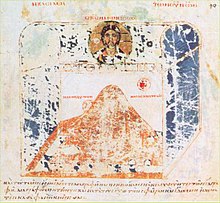Kosmas Indicopleustes
Kosmas Indicopleustes ( ancient Greek Κοσμᾶς Ἰνδικοπλεύστης Kosmás Indicopleústēs "Kosmas the Indians") was a late antique writer and traveler from Alexandria and contemporary of Emperor Justinian I. The real name of the author is unknown; from around the 9th century he was called Kosmas Indicopleustes .
life and work
The author was a Nestorian Christian and traveled as a merchant to the Black Sea , Arabia and East Africa ( Aksum ); Whether it also reached Sri Lanka and southern India is a matter of dispute in research. Around 550 he wrote his Χριστιανικὴ Τοπογραφία ( christianiké topographía , Christian description of the world ) in twelve books, the purpose of which was to refute the Ptolemaic conception of the earth as a sphere. He probably also took a stand against the Christian Aristotelian Johannes Philoponos . Kosmas developed his conception of the world from the Old Testament , especially from the creation story and based on the tabernacle . He imagined the earth as an elongated square surface, over which the universe rose as a two-story vault with the sky above as a roof. In the middle rises the mountain of the north , which is circled by the sun and whose shadow causes the night. To the south is the known world, to the east, across the great ocean, is paradise. The angels move the stars and daily push them behind the mountain, where they are hidden from the view of the people.
The value of his work lies in his geographical, scientific and cultural-historical excursions, in which the traveler Kosmas records his observations and the experiences of others. It influenced several other Byzantine works and is also an attempt to interpret natural events from a fully Christian point of view.
reception
Kosmas' work was used literarily in Arno Schmidt's short novel Kosmas or Vom Berge des Nordens as well as in Umberto Eco's novel Baudolino .
Editions and translations
- Wanda Wolska-Conus: Cosmas Indicopleustès . Paris 1968.
- Horst Schneider (Ed.): Kosmas Indicopleustes. Christian topography. Text-critical analyzes. Translation. Commentary (= Indicopleustoi. Archaeologies of the Indian Ocean. Volume 7). Brepols, Turnhout 2010 (German translation)
literature
- Jean-Marie Flamand: Cosmas Indicopleustès. In: Richard Goulet (ed.): Dictionnaire des philosophes antiques. Volume 2, CNRS Éditions, Paris 1994, ISBN 2-271-05195-9 , pp. 473-478
- Paul Huber: Holy Mountains . Benziger, Zurich 1980, ISBN 3-545-25047-4
- Christoph Markschies : The world in a suitcase, in: C. Markschies u. a. (Ed.), Atlas of World Views. Berlin 2011. pp. 22-30.
Web links
- Entry in the Catholic Encyclopedia , Robert Appleton Company, New York 1913.
- The Christian Topography (English translation of the Topographia Christiana )
- Klaus Anselm Vogel: Sphaera terrae - the medieval image of the earth and the cosmographic revolution. (PDF, 1.4 MB) In: ediss.uni-goettingen.de. Göttingen, 1995 (dissertation).
Remarks
- ↑ a b Peter Schreiner: Kosmas Indicopleustes . In: Lexikon des Mittelalters , Volume 5. Munich / Zurich 1991, Sp. 1457 f.
- ^ Dieter Meyer: Astronomy in early cultures: astronomy in ancient Europe. In: astromeyer.de. August 28, 2006, accessed April 11, 2019 .
| personal data | |
|---|---|
| SURNAME | Kosmas Indicopleustes |
| ALTERNATIVE NAMES | Κόσμας Ἰνδικοπλεύστης (Greek); the Indians (nickname); Cosmas Indicopleustes |
| BRIEF DESCRIPTION | Greek writer and traveler |
| DATE OF BIRTH | 5th century or 6th century |
| DATE OF DEATH | after 550 |

